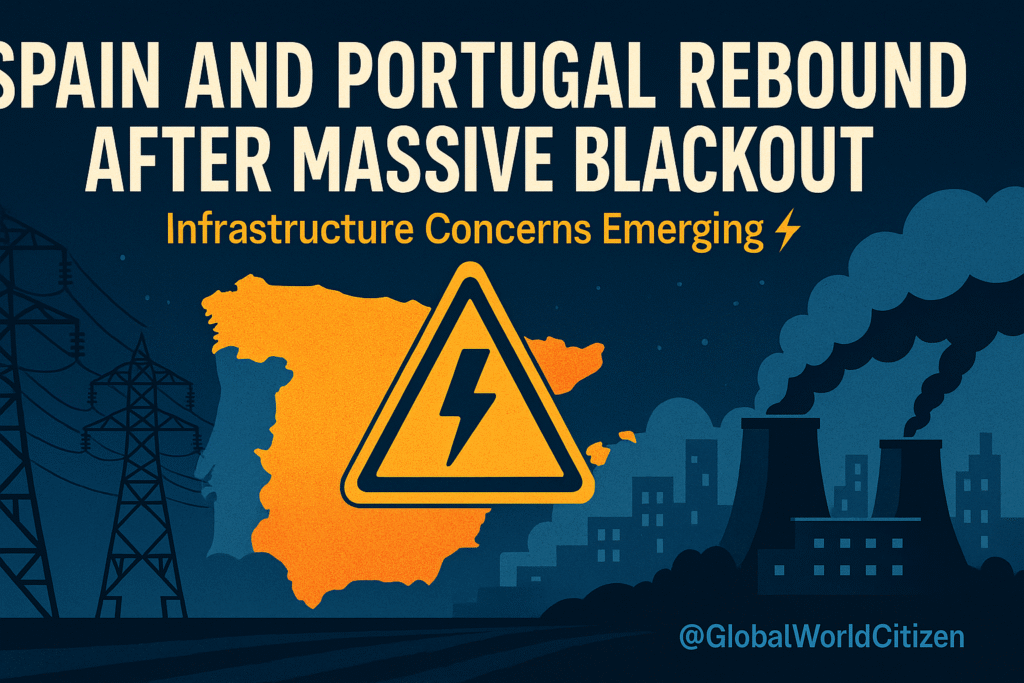Published Date: April 29, 2025 ✍️ Author: Global Energy & Infrastructure Desk 🌐 Source: GlobalWorldCitizen.com
In one of the most severe energy crises in modern European history, Spain and Portugal are slowly returning to normalcy after a massive blackout that exposed deep vulnerabilities in the region’s critical infrastructure.
The unprecedented power outage left millions without electricity, paralyzed public transport, and brought daily life across the Iberian Peninsula to a sudden standstill.
As of Tuesday morning, over 99% of Spain’s power grid has been restored and 6.4 million affected customers in Portugal are back online. However, the cause of the blackout remains unknown, raising urgent questions about grid resilience, energy interdependence, and regional cybersecurity.
 The Iberian Blackout: What Went Wrong?
The Iberian Blackout: What Went Wrong?
On Monday, Spain experienced an instantaneous loss of 15 gigawatts—roughly 60% of its national electricity demand—within five seconds. The sudden collapse triggered a ripple effect across the entire peninsula:
Flights grounded in Madrid, Lisbon, and Barcelona
Subway systems halted, causing commuter chaos
Telecommunications and ATMs failed for hours
Train services suspended, leaving tens of thousands stranded
By early Tuesday, Spanish operator Red Eléctrica and Portugal’s REN confirmed grid stability had been restored and most transport systems, schools, and businesses had reopened.
 Ongoing Investigation: What Caused the Blackout?
Ongoing Investigation: What Caused the Blackout?
Despite massive recovery efforts, no clear cause has yet been identified.
Spain’s meteorological agency AEMET reported no extreme weather
Portugal’s National Cybersecurity Center ruled out cyberattacks
EU officials, including António Costa and Teresa Ribera, confirmed no evidence of foul play or terrorism
“This is one of the most serious infrastructure failures in Europe’s recent history,” said Spain’s Energy Minister Teresa Ribera.
Spain’s national grid operations chief Eduardo Prieto confirmed two rapid “disconnection events” triggered the blackout, but the source remains under investigation by technical and security teams across the EU.
 Transportation Disruption: Chaos Across Cities
Transportation Disruption: Chaos Across Cities
The blackout threw transportation infrastructure into disarray:
Over 35,000 passengers were trapped in disabled trains
Madrid’s Atocha Station was converted into a makeshift shelter
The Madrid Open tennis tournament postponed 22 matches
While Madrid’s metro resumed by Tuesday, Barcelona’s lines continued to face limited service due to “electrical instability”
Emergency responders were mobilized across Spain to evacuate passengers, provide shelter, and restore essential city operations.
 Global Implications: Infrastructure Risk in a Connected World
Global Implications: Infrastructure Risk in a Connected World
The Iberian blackout is not just a local event—it is a warning for countries across the globe. It highlights:
The fragility of interconnected energy systems
The danger of cascading failures in modern grid infrastructure
The need for cyber resilience and real-time monitoring
The urgency of investing in redundant smart grids and rapid recovery protocols
As climate change, aging systems, and geopolitical tensions reshape the global energy landscape, governments must prioritize energy security and infrastructure modernization as core pillars of national strategy.
 What Global World Citizens Must Know
What Global World Citizens Must Know
The Iberian blackout sends an unmistakable message to citizens, businesses, and policymakers worldwide:




At GlobalWorldCitizen.com, we remain committed to tracking, analyzing, and reporting the most important developments in infrastructure, energy, and global systems stability. As nations face rising digital and physical threats, our mission is to empower you with the insight to prepare and adapt.

